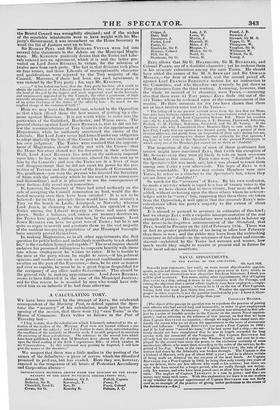NAVAL APPOINTMENTS.
TO TILE EDITOR OF TILE SPECTATOR.
6th April 1936. SIR—In your comments, last week, on some recent objectionable appointments, as you call them, you have fallen into a great error in fact ; which, as the style of your observations was altogether free from bitterness, I think you will be glad to correct. You name, among other appointments, that of Captain 13ouvEarE to a ship, setting it down to his connexion with the Peerage, and raising the objection that a senior officer ought to have been employed,—implying at least, that he is a junior ; whereas he is 11 on the list of Post Captains, having held that rank just thirty-four years. Whether the appointment was proper in other respectg, is not the question touched on by you : I leave it, therefore, to be decided by a less partial judge than your
CONSTANT READER.
[The object of the passage in question was to reprobate the practice of passing over officers who had served long and honourably, in order to give employment to the connexions of the Aristocracy. Our attention was attracted to this subject by a series of forcible articles in the Courier on the recent Naval appointments; and on referring to the columns of that journal, we find that we have done Captain Bouveiirc no injustice,—though we might have stated more distinctly the reason why we set down his appointment to the score of aristocratic birth and influence. Captain Bouve km was made a Post Captain in 1802; and if he had never "served his turn,"—if he had never had a ship,—we certainly should not have complained that he was at length rewarded for long service with the command of the Vanguard. But Captain BouvEalz has already had the command of a ship—the Windsor Castle ; and now he is employed for the second time since the peace, to the exclusion certainly of 1.0I118 meritorious officer, who must thus, according to the rules of the service, be deprived of his 11 ig. Thus, in the case of Captain Bouv ERIE, the rule of promotion laid down by the Admiralty was broken through. The Captain is also a Colonel of Marines, with pay of about 600/. a year ; anti he is almost certain of being made an Admiral on the creation of the next batch. As Captain Bouvaitie was a Post Captain in 1802, he being then only twenty-two years of age we believe, there are few officers who rank as his seniors; but there are some who have served for a longer period, who are really though not technically his seniors, and who have been passed over to allow him to have a diubk turn. The neglect of Captain TRENILETT is a case in point; and thole are many, very many such cases. With this explanation we leave it to our readers to say whether the second appointment of Captain Bouvesis was not fairly used as an example of the ptactice of giving undue preference to the scions of the AristocrAry.—Ea.]


























 Previous page
Previous page